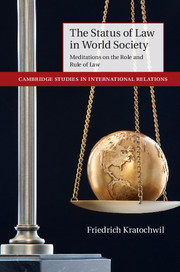Book contents
- Frontmatter
- Dedication
- Epigraph
- Contents
- Preface
- Introduction: images of law
- Meditation 1 Inter-disciplinarity, the epistemological ideal of incontrovertible foundations, and the problem of praxis
- Meditation 2 On the concept of law
- Meditation 3 On constitutions and fragmented orders
- Meditation 4 Of experts, helpers, and enthusiasts
- Meditation 5 The power of metaphors and narratives: systems, teleology, evolution, and the issue of the “global community”
- Meditation 6 Cosmopolitanism, publicity, and the emergence of a “global administrative law”
- Meditation 7 The politics of rights
- Meditation 8 The limits and burdens of rights
- Meditation 9 The bounds of (non)sense
- Index
- References
Meditation 6 - Cosmopolitanism, publicity, and the emergence of a “global administrative law”
Published online by Cambridge University Press: 05 June 2014
- Frontmatter
- Dedication
- Epigraph
- Contents
- Preface
- Introduction: images of law
- Meditation 1 Inter-disciplinarity, the epistemological ideal of incontrovertible foundations, and the problem of praxis
- Meditation 2 On the concept of law
- Meditation 3 On constitutions and fragmented orders
- Meditation 4 Of experts, helpers, and enthusiasts
- Meditation 5 The power of metaphors and narratives: systems, teleology, evolution, and the issue of the “global community”
- Meditation 6 Cosmopolitanism, publicity, and the emergence of a “global administrative law”
- Meditation 7 The politics of rights
- Meditation 8 The limits and burdens of rights
- Meditation 9 The bounds of (non)sense
- Index
- References
Summary
Introduction
The debate of the emergence of a global administrative law follows and parallels a series of debates in international law on constitutionalization that were conducted with different emphases on both sides of the Atlantic. In the USA the “constitutional” debate – and here again we might distinguish the debates concerning the issue of “federal pre-emption” and the issue of “proper delegation” of powers to administrative agencies – took place together with an “internationalist” debate that centred on both the disaggregation of the state and the emergence of governmental networks. In Europe the emphasis was somewhat different in that there the European experiment played an important role. It addressed the EU’s “democratic deficit” and focused on attempts to give the ordo-liberal interpretation of the EU some broader constitutional moorings. Thus both the inclusion of human rights incorporating the meanwhile extensive jurisprudence of the ECtHR as well as the push for a “constitutional treaty” aimed at improving the accountability of the European institutions and at increasing the legitimacy of the European project. At the same time this debate linked up with the discussions concerning the emergence of an “international” (administrative) law, but here was indebted more to an international and comparative law perspective than to the American tradition of administrative law.
Of course all these debates also related to the more general issues concerning “liberalization” moves. The two focal points were then on the one hand the “transition” countries that had to come to terms with their communist legacy, and on the other hand the promotion of the “rule of law,” which had become an explicit concern for US foreign policy – soon to be “operationalized” as an imperative for “regime change.” Even the UN and some of its “functional” organizations, such as the IMF and the World Bank, seemed to be caught by the sea change by taking leave of a narrow conception of their “functionalist” mission and enlarging their agendas. In this way the neo-classical orthodoxy that had informed the Washington consensus moved towards a “post Washington Consensus.” The latter contained some new policies such as poverty abatement, greater accountability of governments and international organizations, the promotion of the “rule of law,” and the adoption of “best practices” developed by experts in informal networks, sometimes even with the participation of members of civil society.
- Type
- Chapter
- Information
- The Status of Law in World SocietyMeditations on the Role and Rule of Law, pp. 168 - 199Publisher: Cambridge University PressPrint publication year: 2014



